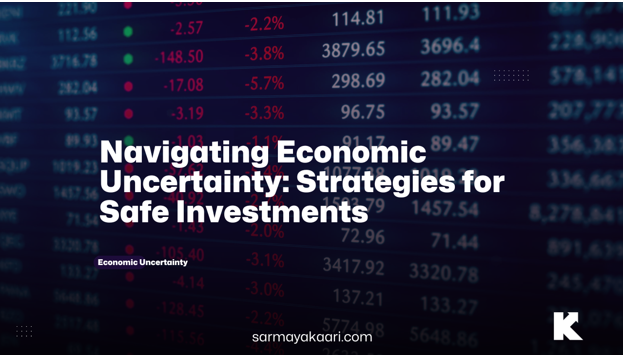Economic uncertainty can significantly impact financial wellbeing, creating both challenges and opportunities. It’s crucial to adapt, manage risks, and safeguard financial futures. This blog explores practical financial strategies and tips for navigating economic uncertainty and achieving greater financial resilience.
Understanding Economic Uncertainty
Market Volatility
Market volatility refers to the fluctuations in the market, influenced by economic cycles and geopolitical events. These fluctuations can affect investment portfolios and financial planning. To navigate market volatility:
- Stay Informed: Keep up with economic news and market trends.
- Diversify: Spread your investments across various asset classes to mitigate risk.
Job Insecurity
Economic downturns often lead to job loss and career changes. To manage job insecurity:
- Develop a Safety Net: Build an emergency fund to cover living expenses for at least six months.
- Enhance Skills: Continuously upgrade your skills to increase employability.
Interest Rates
Changes in interest rates, inflationary pressures, and monetary policies can affect savings, investments, and borrowing costs. To navigate interest rate changes:
- Monitor Rates: Keep an eye on interest rate trends.
- Adjust Strategies: Adapt your investment and savings strategies based on interest rate movements.
Consumer Confidence
Consumer confidence influences spending behaviors and economic indicators. To understand its impact:
- Analyze Trends: Study consumer sentiment reports and spending patterns.
- Adapt Accordingly: Adjust your financial plans based on consumer confidence levels.
Global Events
Global factors, trade tensions, and international developments influence economic stability and financial markets. To manage the impact of global events:
- Stay Updated: Follow global economic news.
- Diversify Globally: Consider international investments to spread risk.
Financial Strategies for Uncertain Times
Emergency Preparedness
Building an emergency fund is crucial. It provides a financial cushion during unexpected expenses or financial hardships. Tips for emergency preparedness:
- Save Regularly: Set aside a portion of your income each month.
- Maintain Liquidity: Ensure that your emergency fund is easily accessible.
Debt Management
Prioritize debt repayment to reduce financial stress. Strategies for debt management:
- Refinance Loans: Consider refinancing to lower interest rates.
- Pay Down High-Interest Debt: Focus on repaying high-interest debts first.
Budget Adjustments
Review and adjust your budget to manage cash flow better. Tips for budget adjustments:
- Cut Discretionary Spending: Reduce non-essential expenses.
- Prioritize Essentials: Focus on necessary expenditures.
Investment Diversification
Diversify your investment portfolio to mitigate risks. Strategies for diversification:
- Rebalance Regularly: Adjust your asset allocation to maintain a balanced portfolio.
- Invest in Various Assets: Spread investments across different asset classes.
Long-Term Perspective
Maintain a long-term investment horizon. Tips for a long-term perspective:
- Stay Disciplined: Avoid making reactionary decisions based on short-term market volatility.
- Focus on Goals: Keep your long-term financial goals in mind.
Navigating Economic Challenges
Financial Resilience
Building financial resilience involves adapting to changing economic conditions and maintaining a proactive approach to financial planning. Tips for financial resilience:
- Stay Flexible: Be ready to adjust your financial plans as needed.
- Build a Safety Net: Maintain an emergency fund and minimize debt.
Professional Advice
Consult with financial advisors to navigate economic challenges. Benefits of professional advice:
- Expert Insights: Financial advisors provide valuable insights and guidance.
- Personalized Strategies: Advisors can help tailor financial plans to your specific needs.
Continuous Learning
Stay informed about economic trends, financial markets, and industry developments. Strategies for continuous learning:
- Read Financial News: Follow reputable financial news sources.
- Attend Workshops: Participate in financial planning workshops and seminars.
Adaptive Strategies
Implement adaptive strategies and flexible financial plans. Tips for adaptability:
- Regularly Review Plans: Assess your financial plans periodically and make necessary adjustments.
- Prepare for Contingencies: Develop contingency plans for various economic scenarios.
Crisis Management
Develop crisis management plans to navigate economic downturns. Strategies for crisis management:
- Explore Assistance Programs: Look into financial assistance programs available during economic downturns.
- Leverage Resources: Utilize available resources to manage financial stress.
Conclusion
Navigating economic uncertainty requires resilience, adaptability, and proactive financial management strategies. By preparing for emergencies, managing debt responsibly, diversifying investments, and maintaining a long-term perspective, individuals can strengthen their financial resilience, mitigate risks, and achieve greater financial stability and peace of mind. This article is written by The MediaGale.


